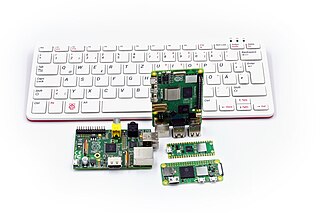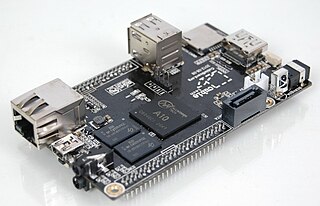Related Research Articles

A Linux distribution is an operating system made from a software collection that includes the Linux kernel and often a package management system. They are often obtained from the website of each distribution, which are available for a wide variety of systems ranging from embedded devices and personal computers to servers and powerful supercomputers.
ARM is a family of RISC instruction set architectures (ISAs) for computer processors. Arm Ltd. develops the ISAs and licenses them to other companies, who build the physical devices that use the instruction set. It also designs and licenses cores that implement these ISAs.
Keith Packard is a software developer, best known for his work on the X Window System.

Unified Extensible Firmware Interface is a specification that defines the architecture of the platform firmware used for booting the computer hardware and its interface for interaction with the operating system. Examples of firmware that implement the specification are AMI Aptio, Phoenix SecureCore, TianoCore EDK II, InsydeH2O. UEFI replaces the BIOS which was present in the boot ROM of all personal computers that are IBM PC compatible, although it can provide backwards compatibility with the BIOS using CSM booting. Intel developed the original Extensible Firmware Interface (EFI) specification. Some of the EFI's practices and data formats mirror those of Microsoft Windows. In 2005, UEFI deprecated EFI 1.10.
Computer operating systems based on the Linux kernel are used in embedded systems such as consumer electronics, in-vehicle infotainment (IVI), networking equipment, machine control, industrial automation, navigation equipment, spacecraft flight software, and medical instruments in general.
Technical variations of Linux distributions include support for different hardware devices and systems or software package configurations. Organizational differences may be motivated by historical reasons. Other criteria include security, including how quickly security upgrades are available; ease of package management; and number of packages available.

A free and open-source graphics device driver is a software stack which controls computer-graphics hardware and supports graphics-rendering application programming interfaces (APIs) and is released under a free and open-source software license. Graphics device drivers are written for specific hardware to work within a specific operating system kernel and to support a range of APIs used by applications to access the graphics hardware. They may also control output to the display if the display driver is part of the graphics hardware. Most free and open-source graphics device drivers are developed by the Mesa project. The driver is made up of a compiler, a rendering API, and software which manages access to the graphics hardware.

CrunchBang Linux was a Linux distribution derived from Debian by Philip Newborough.

The TurnKey Linux Virtual Appliance Library is a free open-source software project which develops a range of Debian-based pre-packaged server software appliances. Turnkey appliances can be deployed as a virtual machine, in cloud computing services such as Amazon Web Services or installed in physical computers.
The Trim-Slice is a small, fanless nettop computer manufactured by the Israeli company CompuLab. Trim-Slice is the first commercially available desktop computer based on the NVIDIA Tegra 2. It was announced in January 2011 and began shipping in late April 2011.

Raspberry Pi is a series of small single-board computers (SBCs) developed in the United Kingdom by the Raspberry Pi Foundation in association with Broadcom. The Raspberry Pi project originally leaned toward the promotion of teaching basic computer science in schools. The original model became more popular than anticipated, selling outside its target market for diverse uses such as robotics, home automation, industrial automation, and by computer and electronic hobbyists, because of its low cost, modularity, open design, and its adoption of the HDMI and USB standards.

Bodhi Linux is a light-weight Linux distribution based on Ubuntu that uses an Enlightenment DR17-based fork called Moksha as its desktop environment. The philosophy for the distribution is to provide a minimal base system so that users can install the software they want. In turn, the distribution only includes software that is essential to most users, such as a file manager (Thunar), a terminal emulator (Terminology), and a web browser. To install additional software, Bodhi Linux developers maintain a browser-based app store that uses apturl to install programs.

Leafpad is a free and open-source graphical text editor for Linux, Berkeley Software Distribution (BSD), and Maemo that is similar to the Microsoft Windows program Notepad. Created with the focus of being a lightweight text editor with minimal dependencies, it is designed to be simple-to-use and easy-to-compile.

The Allwinner A1X is a family of single-core SoC devices designed by Allwinner Technology from Zhuhai, China. Currently the family consists of the A10, A13, A10s and A12. The SoCs incorporate the ARM Cortex-A8 as their main processor and the Mali 400 as the GPU.

Kali Linux is a Linux distribution designed for digital forensics and penetration testing. It is maintained and funded by Offensive Security. The software is based on the Debian Testing branch: most packages Kali uses are imported from the Debian repositories.

OpenZFS is an open-source implementation of the ZFS file system and volume manager initially developed by Sun Microsystems for the Solaris operating system and now maintained by the OpenZFS Project. It supports features like data compression, data deduplication, copy-on-write clones, snapshots, and RAID-Z. It also supports the creation of virtual devices, which allows for the creation of file systems that span multiple disks.

Banana Pi is a line of single-board computers produced by the Chinese company Shenzhen SINOVOIP Company, its spin-off Guangdong BiPai Technology Company, and supported by Hon Hai Technology (Foxconn). Its hardware design was influenced by the Raspberry Pi, and both lines use the same 40-pin I/O connector.
RISC-V is an open standard instruction set architecture (ISA) based on established reduced instruction set computer (RISC) principles. The project began in 2010 at the University of California, Berkeley, transferred to the RISC-V Foundation in 2015, and on to RISC-V International, a Swiss non-profit entity, in November 2019. Like several other RISC ISA, including Amber (ARMv2), OpenPOWER, OpenSPARC / LEON, and OpenRISC, RISC-V is offered under royalty-free open-source licenses. The documents defining the RISC-V instruction set architecture (ISA) are offered under the BSD License.

Q4OS is a light-weight Linux distribution, based on Debian, targeted as a replacement for operating systems that are no longer supported on outdated hardware. The distribution is known for an addon called XPQ4, which adds themes intended to replicate the look and feel of Windows 2000 and Windows XP.
References
- ↑ "CompuLab introduces Utilite - a single-core to quad-core ARM Linux desktop starting at 99$". July 14, 2013. Archived from the original on August 8, 2013. Retrieved August 22, 2013.
- ↑ "Utilite models". Archived from the original on 2014-08-18. Retrieved 2013-08-22.
